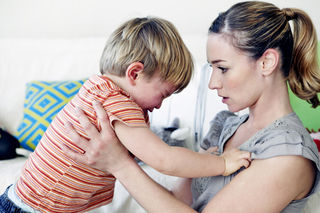
I have rarely met a parent who did not, at one time or another, wonder if some aspect of their child’s development was “normal.” There are good reasons for this. Gone are the days when extended kin and large numbers of siblings shared in the tasks of childrearing. Late-modern life finds many of us parenting in relative isolation, without the accumulated wisdom or helpful hands of grandmothers, aunts, or cousins. We are faced, too, with an endless supply of scientific (and pseudo-scientific) information about children’s health and development. Parenting advice fills the Internet, but instead of easing our anxieties, it often just attunes us to a broad array of potential problems.
It is no surprise, then, that so many of us find ourselves asking, “Is my child normal?"

But what do we mean by “normal?" The concept has become a pivotal, taken-for-granted way that we make sense of human variation. However, the whole notion that some characteristics are regular, average, or standard did not emerge in Western cultures until the mid-nineteenth century. As Lennard Davis documents in his 1995 book, Enforcing Normalcy, prior to this period there were literary and artistic representations of the ideal, but such forms were tied to the divine and, by definition, not humanly attainable. Only with the emergence of statistics and the bell-shaped curve did the idea of “normalcy” take root in the collective imagination. Far from a timeless benchmark against which people have always measured themselves, “normalcy” is but one way to think about human diversity.
Nonetheless, we tend to think of “normal” as an immutable category, rooted in human evolution. We might assume, for example, that whatever is not normal is “pathological”—and that science can help us make the distinction. This perspective has utility in certain medical contexts, but it neglects normalcy’s social dimensions. In everyday speech, the word “normal” has moral significance, meaning that it doesn’t just describe how things are but indicates something about how they should be. In this way, the “norm” does often refer to a cultural ideal.
This point became clear to me during my interviews with middle-class parents whose children faced challenges ranging from learning disabilities to substance addictions. Beyond the difficult work of trying to meet their children’s needs—and, in some cases, bearing the emotional hardship of watching their children struggle—parents often grappled with what it meant to have a child who did not seem “normal.” Like so many of us, they had entered into parenthood with a set of unspoken but powerful assumptions about who their children would be and how their lives would unfold—solid grades, good friends, and extracurricular activities followed by college attendance, secure employment, and families of their own.
Children’s struggles often revealed the extent to which parents’ definitions of “normalcy” aligned with the assumed touchstones of a “well-lived” life. Indeed, the “normal child” of our imaginations often says more about mainstream American values than the messy, multifaceted lives of actual children. In hindsight, many of the parents I interviewed were grateful for the opportunity to revise their expectations and reorganize their priorities. They believed that they were better, more compassionate people for having let go of “normalcy.”
What does all of this mean for parents who worry?
After all, many children do face real challenges, and many conditions require expert identification and intervention. Even so, dwelling on whether or not a child is “normal” can do more harm than good. When our benchmark is normalcy, we tend to see differences as strange or undesirable. This is part of the concept’s statistical legacy: Most early statisticians were eugenicists who hoped to eliminate “undesirable” deviation and improve the human race. Questions such as "What are my child’s needs?” or “What can be done to improve this situation?” direct our attention to the tasks at hand. Questions about “normalcy,” on the other hand, are too often layered with anxiety, guilt, and shame.
This post was excerpted in part from Family Trouble: Middle-Class Parents, Children’s Problems, and the Disruption of Everyday Life (Rutgers University Press 2015).
References
Davis, Lennard J. Enforcing Normalcy: Disability, Deafness, and the Body. London: Verso, 1995.
Stearns, Peter. Anxious Parents: A History of Modern Childrearing in America. New York: New York University Press, 2003.

